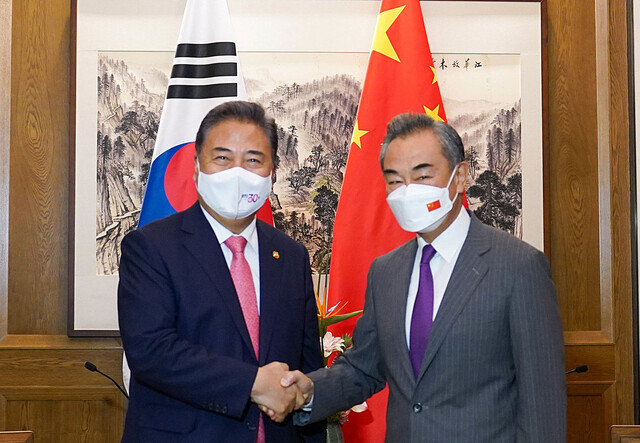hankyoreh
Links to other country sites 다른 나라 사이트 링크
[Editorial] China’s unprecedented “five requests” won’t improve S. Korea-China relations

The talks between South Korean and Chinese foreign ministers on Tuesday in Qingdao, China, clearly showed the two sides’ differences on the issues of the Terminal High Altitude Area Defense (THAAD) anti-missile system and the “Chip 4” semiconductor dialogue.
Chinese Foreign Minister Wang Yi unilaterally stressed China’s position, insisting on “five requirements” in South Korea-China relations. This necessitates a strategic response from Seoul, which has to manage relations on a stable footing while making it clear that the two sides are equal neighbors who respect one another.
Speaking on Wednesday, South Korean Minister of Foreign Affairs Park Jin said he had “made it clear to China” at the talks that the so-called “three noes” approach on the THAAD issue was “neither an agreement nor a pledge.”
Reacting to China’s claim that the “three noes” — no additional THAAD deployment, no participation in the US missile defense system, and no participation in a trilateral military alliance with the US and Japan — represented an agreement that Seoul was obliged to uphold, Park said he had “made it clear that our response to the North Korean nuclear issue and missile threat is a matter of autonomous defensive methods and our security sovereignty.”
In contrast, a Chinese Foreign Ministry spokesperson said the day after the talks that South Korea had “officially announced its policy of ‘three nos’ and ‘one restriction’” — introducing the new claim that Seoul had agreed to “restrict” the use of its currently deployed THAAD system.
This marks the first time the Chinese government has openly made this demand of South Korea. It raises the troubling possibility that the clash between the two sides is poised to sour further over the THAAD issue.
They have also shown major differences in their views on the Chip 4 framework for strategic dialogue on semiconductor supply chains.
In connection with the US-led dialogue, in which South Korea, Japan, and Taiwan have been participating, Park said he had stressed that South Korea has no intention of excluding any specific countries, and that South Korea could play a role of dispelling China’s concerns from within the Chip 4 framework.
But the Chinese Foreign Ministry stated the position that South Korea and China should work together to stop the US from reorganizing the global supply chains.
The most troubling thing of all was Wang Yi’s message about the “five requirements” in South Korea-China relations — a list that included ruling out external influence, showing consideration of major areas of concern, noninterference in internal affairs, maintenance of supply chains and adhering to multilateralism.
His remarks have been interpreted as calling on Seoul to stop favoring Washington in its diplomatic approach and to respect Beijing’s positions on issues such as THAAD, semiconductors and Taiwan. But it is extremely inappropriate for China to give the appearance that it is unilaterally presenting “guidelines” for South Korea to follow.
The first summit of foreign ministers between the two countries since the Yoon Suk-yeol administration took office failed in its aim of establishing South Korea-China relations on a new footing. As the two nations prepare to celebrate the 30th anniversary of their diplomatic relationship later this month, they face stiffer challenges than ever before.
This will put Seoul’s diplomatic acumen to the test — and its ability to develop and implement a sophisticated strategy based on its own principles.
Please direct questions or comments to [english@hani.co.kr]

Editorial・opinion
![[Column] Has Korea, too, crossed the Rubicon on China? [Column] Has Korea, too, crossed the Rubicon on China?](https://flexible.img.hani.co.kr/flexible/normal/500/300/imgdb/original/2024/0419/9317135153409185.jpg) [Column] Has Korea, too, crossed the Rubicon on China?
[Column] Has Korea, too, crossed the Rubicon on China?![[Correspondent’s column] In Japan’s alliance with US, echoes of its past alliances with UK [Correspondent’s column] In Japan’s alliance with US, echoes of its past alliances with UK](https://flexible.img.hani.co.kr/flexible/normal/500/300/imgdb/original/2024/0419/2317135166563519.jpg) [Correspondent’s column] In Japan’s alliance with US, echoes of its past alliances with UK
[Correspondent’s column] In Japan’s alliance with US, echoes of its past alliances with UK- [Editorial] Does Yoon think the Korean public is wrong?
- [Editorial] As it bolsters its alliance with US, Japan must be accountable for past
- [Guest essay] Amending the Constitution is Yoon’s key to leaving office in public’s good graces
- [Editorial] 10 years on, lessons of Sewol tragedy must never be forgotten
- [Column] A death blow to Korea’s prosecutor politics
- [Correspondent’s column] The US and the end of Japanese pacifism
- [Guest essay] How Korea turned its trainee doctors into monsters
- [Guest essay] As someone who helped forge Seoul-Moscow ties, their status today troubles me
Most viewed articles
- 1[Column] The clock is ticking for Korea’s first lady
- 2[Correspondent’s column] In Japan’s alliance with US, echoes of its past alliances with UK
- 3After 2 months of delayed, denied medical care, Koreans worry worst may be yet to come
- 4[Column] Has Korea, too, crossed the Rubicon on China?
- 5[Editorial] When the choice is kids or career, Korea will never overcome birth rate woes
- 6Samsung barricades office as unionized workers strike for better conditions
- 7US exploring options for monitoring N. Korean sanctions beyond UN, says envoy
- 8US overtakes China as Korea’s top export market, prompting trade sanction jitters
- 9[Photo] Smile ambassador, you’re on camera
- 10Hong Se-hwa, voice for tolerance whose memoir of exile touched a chord, dies at 76